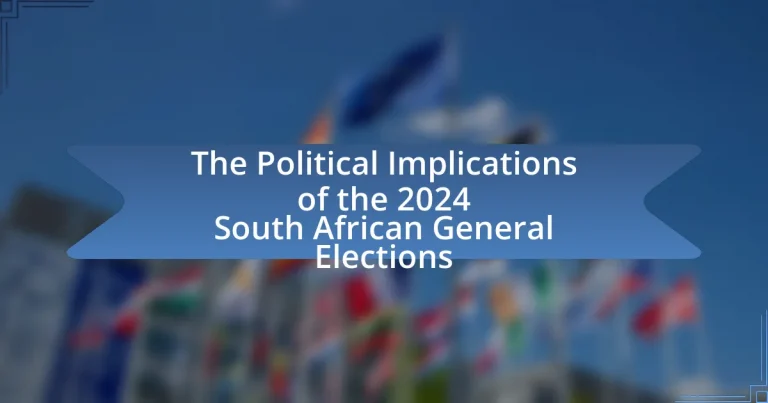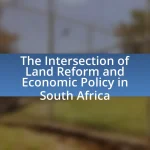The article examines the political implications of the 2024 South African General Elections, highlighting the potential shifts in governance and policy direction as public sentiment evolves around issues such as economic inequality, corruption, and service delivery. It discusses the declining support for the African National Congress (ANC) and the rising influence of opposition parties like the Democratic Alliance and the Economic Freedom Fighters, indicating a possible coalition government. Key factors influencing voter sentiment, including demographic trends, political events, and the role of political parties, are analyzed to understand their impact on the electoral landscape and future governance in South Africa. The article also explores how voter demographics, particularly youth engagement, are shaping the political discourse leading up to the elections.
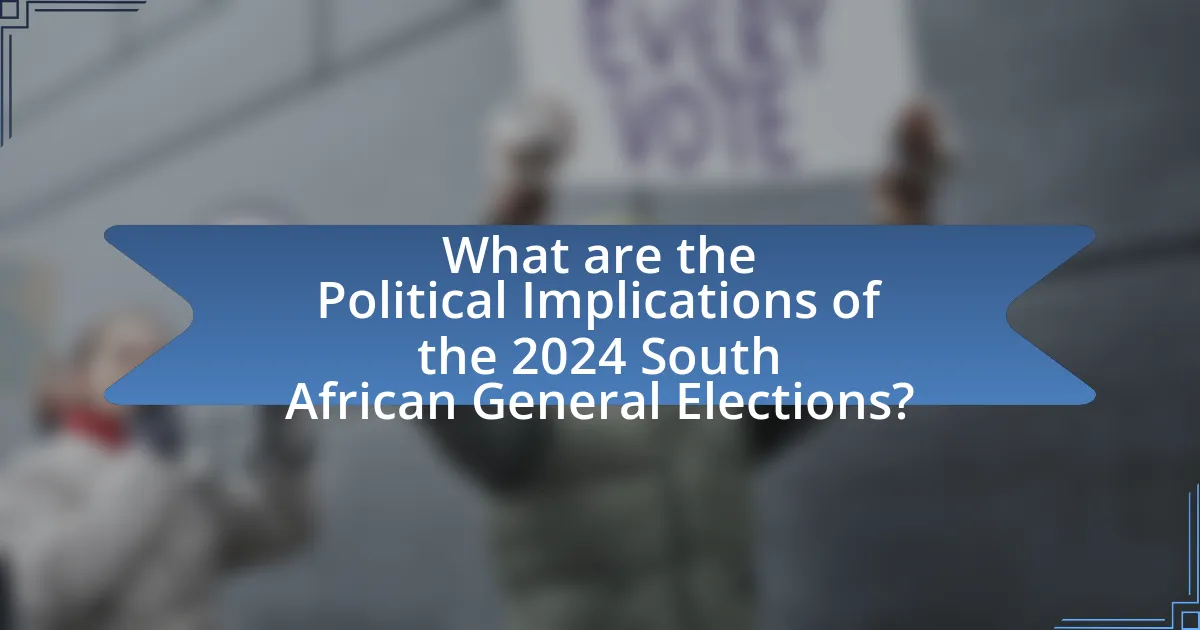
What are the Political Implications of the 2024 South African General Elections?
The political implications of the 2024 South African General Elections are significant, as they may determine the future direction of governance and policy in the country. The elections are expected to reflect public sentiment regarding issues such as economic inequality, corruption, and service delivery, which have been central to the political discourse in recent years. Historical trends indicate that the African National Congress (ANC) has faced declining support, suggesting a potential shift in power dynamics, possibly leading to a coalition government if opposition parties gain enough traction. Additionally, the outcome could influence South Africa’s foreign relations and economic policies, particularly in light of ongoing challenges such as unemployment and energy crises.
How do the upcoming elections reflect the current political climate in South Africa?
The upcoming elections in South Africa reflect a politically charged climate characterized by widespread dissatisfaction with the ruling African National Congress (ANC) and a growing demand for change. Recent polls indicate that the ANC’s support has declined significantly, dropping to around 50% in some surveys, which highlights the electorate’s frustration over issues such as corruption, economic instability, and service delivery failures. This discontent has led to a rise in support for opposition parties, particularly the Democratic Alliance and the Economic Freedom Fighters, signaling a potential shift in power dynamics. The elections are expected to be a critical test of the ANC’s ability to maintain its long-standing dominance in South African politics amidst these challenges.
What key issues are influencing voter sentiment ahead of the elections?
Key issues influencing voter sentiment ahead of the 2024 South African General Elections include economic instability, high unemployment rates, and concerns over corruption. Economic instability is highlighted by South Africa’s GDP growth rate, which has struggled to exceed 1% in recent years, leading to widespread dissatisfaction among voters. High unemployment, particularly among youth, stands at approximately 34%, prompting calls for effective job creation strategies. Additionally, corruption scandals involving government officials have eroded public trust, with a 2022 survey indicating that 70% of South Africans believe corruption is a major issue affecting their lives. These factors collectively shape voter sentiment as citizens seek accountability and effective governance.
How have recent political events shaped public perception of the major parties?
Recent political events have significantly influenced public perception of the major parties in South Africa, particularly through the impact of corruption scandals and economic challenges. The African National Congress (ANC) has faced declining support due to ongoing allegations of corruption involving high-profile leaders, which have eroded trust among voters. For instance, the release of the Zondo Commission report in 2022 detailed extensive corruption within the ANC, leading to a drop in their approval ratings to around 50% by mid-2023, according to a survey by the Institute of Race Relations.
Conversely, the Democratic Alliance (DA) has gained traction as a viable alternative, capitalizing on public dissatisfaction with the ANC’s governance. The DA’s focus on transparency and effective service delivery has resonated with voters, reflected in their increased support in urban areas, where they have won key municipalities. Additionally, the rise of new political movements, such as the Economic Freedom Fighters (EFF), has further fragmented the political landscape, compelling traditional parties to adapt their strategies to maintain relevance. This dynamic has led to a more polarized electorate, with voters increasingly aligning with parties that address their immediate concerns regarding governance and economic stability.
What role do political parties play in shaping the outcomes of the elections?
Political parties play a crucial role in shaping the outcomes of elections by organizing candidates, mobilizing voters, and articulating policy positions. They serve as the primary vehicle through which political ideologies are communicated to the electorate, influencing voter preferences and turnout. For instance, in the 2019 South African elections, the African National Congress secured over 57% of the vote, largely due to its established party structure and historical significance, demonstrating how party organization can directly impact electoral success. Additionally, political parties engage in campaign strategies that include advertising, debates, and grassroots mobilization, which further shape public perception and voting behavior.
Which parties are expected to dominate the 2024 elections and why?
The African National Congress (ANC) and the Democratic Alliance (DA) are expected to dominate the 2024 South African elections. The ANC, as the ruling party, has maintained significant support despite challenges, largely due to its historical legacy and established voter base. In contrast, the DA is anticipated to gain traction by appealing to urban voters and those disillusioned with the ANC’s governance, particularly regarding issues like corruption and service delivery. Recent polls indicate a potential shift in voter sentiment, with the ANC’s support declining and the DA’s increasing, reflecting a growing desire for change among the electorate.
How are party alliances and coalitions affecting the electoral landscape?
Party alliances and coalitions are significantly reshaping the electoral landscape by enabling smaller parties to gain representation and influence in governance. In South Africa, the formation of coalitions, particularly after the 2019 elections, has led to a more fragmented political environment where no single party can easily secure a majority. For instance, the Democratic Alliance and other opposition parties have formed alliances to challenge the African National Congress’s dominance, resulting in a shift in voter dynamics and strategic campaigning. This trend is evidenced by the 2021 local elections, where coalition governments emerged in several municipalities, reflecting a growing trend towards collaborative governance and altering traditional voting patterns.
What impact could the election results have on South Africa’s governance?
The election results could significantly reshape South Africa’s governance by determining the balance of power among political parties. A shift in majority control may lead to changes in policy direction, impacting economic reforms, social programs, and governance strategies. For instance, if the African National Congress loses its majority, coalition governance could emerge, necessitating compromises that may alter existing policies on land reform and economic inequality. Historical context shows that the 2019 elections resulted in a weakened ANC, prompting a focus on anti-corruption measures and economic revitalization efforts. Thus, the 2024 election outcomes will likely influence governance dynamics, policy priorities, and the overall political landscape in South Africa.
How might the election outcomes influence policy direction in key areas?
Election outcomes in the 2024 South African General Elections will significantly influence policy direction in key areas such as economic reform, social justice, and environmental sustainability. For instance, if the ruling party retains power, it may continue its focus on land reform and economic redistribution, as evidenced by previous policies aimed at addressing historical inequalities. Conversely, if opposition parties gain strength, there could be a shift towards more market-oriented policies, potentially impacting investment and economic growth strategies. Historical data from past elections indicates that shifts in party power often lead to substantial changes in legislative priorities, reflecting the electorate’s demands and concerns.
What are the potential consequences for social stability and economic growth?
The potential consequences for social stability and economic growth in South Africa following the 2024 General Elections include increased political polarization and economic uncertainty. Political polarization can lead to social unrest, as differing factions may clash over governance and policy direction, undermining social cohesion. Economic uncertainty often arises from fluctuating investor confidence, which can result in reduced foreign direct investment and slower economic growth. For instance, historical data shows that political instability in South Africa has previously correlated with declines in GDP growth rates, highlighting the tangible impact of governance on economic performance.
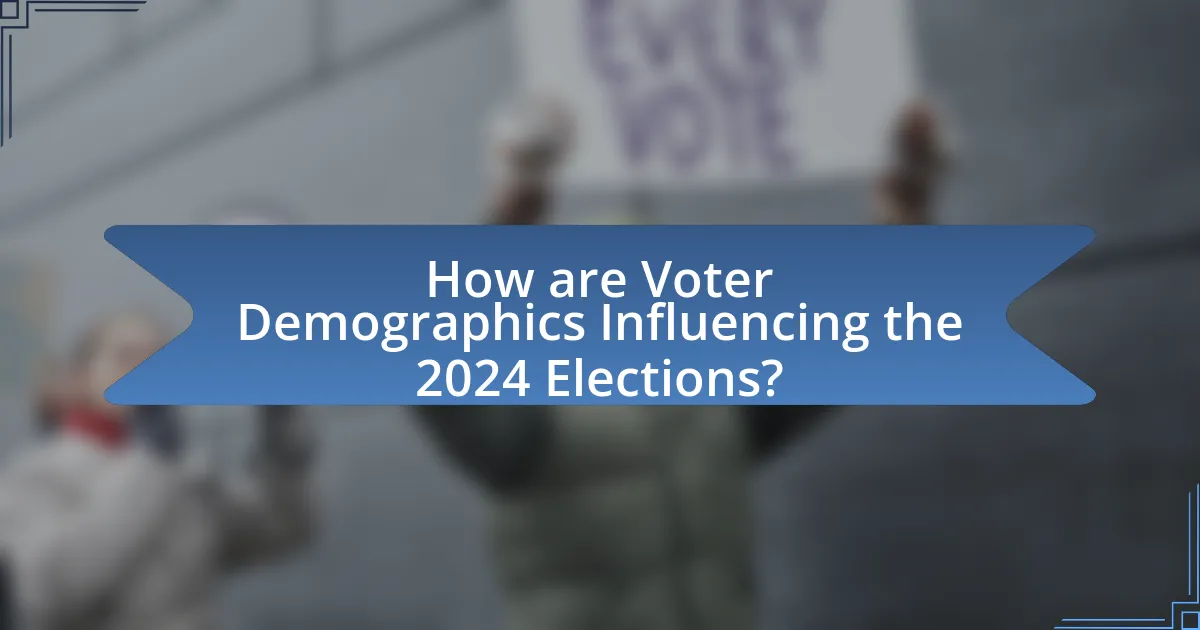
How are Voter Demographics Influencing the 2024 Elections?
Voter demographics are significantly influencing the 2024 South African elections by shaping party strategies and electoral outcomes. The increasing youth population, which constitutes a substantial portion of the electorate, is driving parties to focus on issues like unemployment and education, as evidenced by the 2021 census data showing that individuals aged 18-34 make up over 35% of the voting age population. Additionally, the growing diversity in racial and ethnic groups is prompting political parties to tailor their messages to resonate with various communities, as seen in the African National Congress’s (ANC) outreach efforts to engage with younger voters and marginalized groups. This demographic shift is crucial, as it can determine the success of parties in mobilizing support and ultimately winning seats in the National Assembly.
What demographic trends are emerging in the lead-up to the elections?
Emerging demographic trends in the lead-up to the 2024 South African General Elections include a significant increase in youth voter registration and a growing urban-rural divide. The youth, particularly those aged 18 to 29, are becoming more politically active, with registration rates rising by approximately 15% compared to previous elections, reflecting a heightened interest in political participation. Additionally, urban areas are experiencing a demographic shift as more individuals migrate from rural regions, leading to a concentration of voters in cities, which influences electoral outcomes and party strategies. This urbanization trend is evidenced by the 2021 census data, which shows that urban populations have increased by 10% over the last decade, impacting the political landscape as parties adapt to the needs and preferences of urban voters.
How do age, race, and socioeconomic status affect voting behavior?
Age, race, and socioeconomic status significantly influence voting behavior in South Africa. Younger voters, particularly those aged 18-24, tend to exhibit lower turnout rates compared to older demographics, with only 25% of this age group participating in the 2019 elections. Racial dynamics also play a crucial role; for instance, Black South Africans overwhelmingly support the African National Congress (ANC), while White voters are more likely to favor opposition parties like the Democratic Alliance (DA). Socioeconomic status further impacts voting, as individuals from lower-income backgrounds often prioritize issues like employment and social services, which can lead to higher support for parties advocating for social justice. According to the Electoral Commission of South Africa, these factors collectively shape electoral outcomes and party strategies, highlighting the complex interplay between demographic characteristics and political engagement.
What role does urban versus rural voting play in the election outcomes?
Urban versus rural voting significantly influences election outcomes by reflecting differing political preferences and priorities. Urban voters tend to favor progressive policies and parties, often prioritizing issues like social justice, economic development, and environmental concerns. In contrast, rural voters typically support conservative policies, emphasizing agricultural interests, traditional values, and local governance.
In the 2019 South African elections, for example, the African National Congress (ANC) garnered substantial support in urban areas, while the Economic Freedom Fighters (EFF) and other parties found stronger backing in rural regions. This division illustrates how urban areas can drive higher voter turnout and influence policy agendas, while rural areas may sway elections through concentrated support for specific parties.
The 2024 elections are likely to see similar patterns, with urbanization trends continuing to shape voter demographics and preferences, thereby impacting overall election results.
How are youth voters shaping the political landscape?
Youth voters are significantly shaping the political landscape by increasing their participation in elections and influencing policy discussions. In South Africa, for instance, the youth demographic, which constitutes a substantial portion of the electorate, has been pivotal in advocating for issues such as climate change, education reform, and economic opportunities. According to the Electoral Commission of South Africa, voter turnout among young people has risen, reflecting their growing engagement and impact on political outcomes. This demographic’s preferences and activism are prompting political parties to adapt their platforms to resonate with younger constituents, thereby altering traditional political dynamics.
What issues are most important to young voters in 2024?
The most important issues for young voters in 2024 include unemployment, education, climate change, and social justice. Unemployment rates among South African youth are alarmingly high, with statistics indicating that over 60% of young people are unemployed, making job creation a top priority. Education remains critical, as many young voters seek access to quality education and vocational training to improve their job prospects. Climate change is increasingly significant, with young voters advocating for sustainable policies and action against environmental degradation. Lastly, social justice issues, including equality and human rights, resonate strongly, as young voters demand reforms to address systemic inequalities. These issues reflect the urgent concerns of the youth demographic in South Africa as they approach the 2024 elections.
How are political parties engaging with the youth demographic?
Political parties in South Africa are engaging with the youth demographic through targeted social media campaigns, youth-focused events, and policy initiatives that address issues relevant to young voters. For instance, the African National Congress (ANC) has launched initiatives like the “Youth Month” campaign to promote youth participation in politics and highlight issues such as unemployment and education. Additionally, the Economic Freedom Fighters (EFF) actively utilize platforms like Twitter and Instagram to communicate their messages and mobilize young supporters, reflecting a strategic approach to reach this demographic effectively. According to a 2023 survey by the South African Institute of Race Relations, 65% of young voters expressed a preference for parties that prioritize youth issues, underscoring the importance of these engagement strategies.
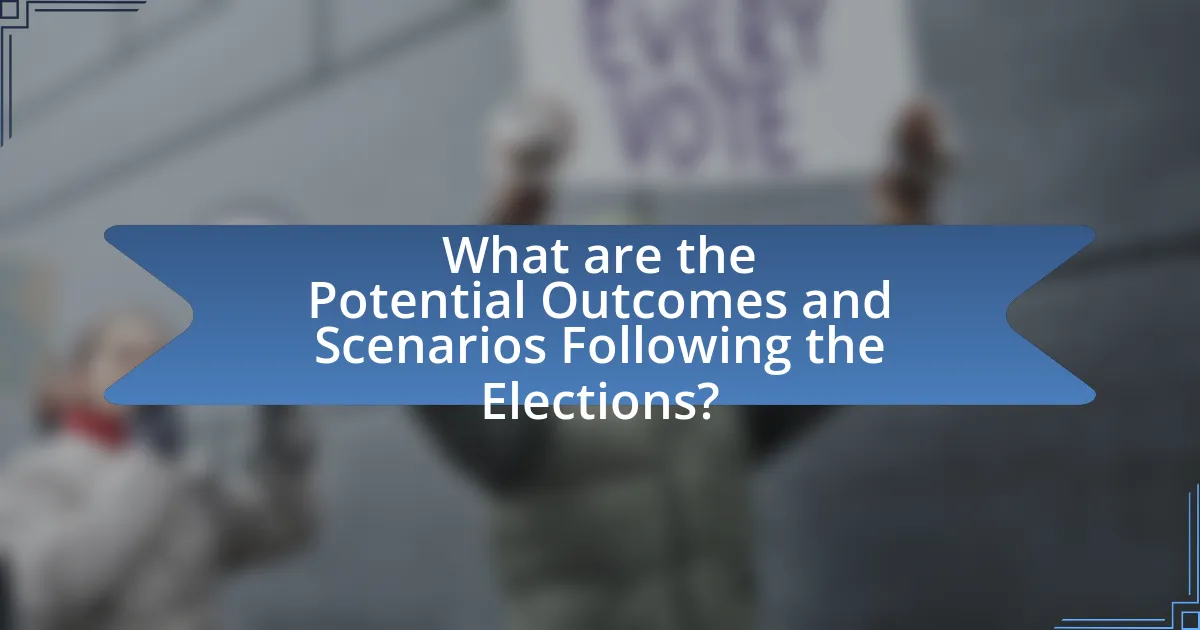
What are the Potential Outcomes and Scenarios Following the Elections?
The potential outcomes and scenarios following the 2024 South African General Elections include a continuation of the African National Congress (ANC) in power, a coalition government, or a significant shift in political power to opposition parties. If the ANC retains its majority, it may pursue its current policies, but with increasing internal dissent and public pressure for reform. Alternatively, a coalition government could emerge if no party secures a clear majority, leading to negotiations among parties that may result in policy compromises and shifts in governance strategies. Historical context shows that in the 2019 elections, the ANC won 57% of the vote, but declining support suggests that a coalition scenario is plausible, especially with the rise of parties like the Economic Freedom Fighters (EFF) and the Democratic Alliance (DA). These dynamics indicate that the elections could significantly reshape South Africa’s political landscape, impacting governance and policy direction.
What are the possible scenarios based on different election outcomes?
Possible scenarios based on different election outcomes in the 2024 South African General Elections include a continuation of the African National Congress (ANC) majority, a coalition government, or a significant rise of opposition parties. If the ANC retains its majority, it may lead to the continuation of current policies and governance strategies, potentially impacting economic stability and social programs. Conversely, if a coalition government emerges, it could result in a more diverse policy approach, reflecting the interests of multiple parties, which may enhance democratic representation but also lead to governance challenges. A significant rise of opposition parties, such as the Democratic Alliance or the Economic Freedom Fighters, could shift the political landscape, prompting reforms and changes in policy direction, particularly in areas like land reform and economic management. Historical context shows that the ANC has faced declining support in recent elections, indicating that shifts in voter sentiment could lead to these varied outcomes.
How might a coalition government change the political dynamics?
A coalition government can significantly alter political dynamics by fostering collaboration among diverse political parties, which may lead to more inclusive policymaking. This shift often results in the necessity for compromise, as parties must negotiate to form a stable government, thereby reducing the dominance of any single party. For instance, in South Africa’s 2024 elections, if no party secures an outright majority, the formation of a coalition could compel parties to address a broader range of issues to satisfy various constituencies, potentially leading to more representative governance. Historical examples, such as the coalition governments in Germany, illustrate how such arrangements can stabilize political landscapes by promoting consensus-driven policies.
What are the implications of a landslide victory for any party?
A landslide victory for any party typically results in a strong mandate to implement its policies and agenda. This overwhelming support can lead to increased political stability, as the winning party may face less opposition in passing legislation. For instance, in the 2019 South African elections, the African National Congress secured a landslide victory, which allowed it to pursue its economic and social policies with greater authority. Additionally, such victories can enhance the party’s public image, attract new supporters, and discourage dissent within its ranks. Historical data shows that parties with significant electoral wins often experience a boost in confidence, enabling them to tackle contentious issues more effectively.
What strategies can voters employ to ensure their voices are heard?
Voters can ensure their voices are heard by actively participating in the electoral process, which includes registering to vote, educating themselves on candidates and issues, and engaging in community discussions. Active participation is crucial; for instance, in South Africa, the Electoral Commission reported that over 26 million people registered to vote in the 2019 elections, highlighting the importance of voter registration in amplifying public opinion. Additionally, voters can utilize social media platforms to raise awareness and advocate for their concerns, as seen in various movements that gained traction through online engagement. Engaging with local representatives and attending town hall meetings also provides voters with direct channels to express their views and influence decision-making.
How can voters effectively engage with political parties before the elections?
Voters can effectively engage with political parties before the elections by participating in public forums, attending rallies, and utilizing social media platforms to communicate their concerns and expectations. Engaging in public forums allows voters to ask questions directly to party representatives, fostering dialogue and transparency. Attending rallies provides an opportunity to hear party platforms firsthand and express support or dissent. Social media platforms enable voters to share their views widely, influencing party agendas and encouraging responsiveness. According to a study by the Electoral Commission of South Africa, increased voter engagement through these methods correlates with higher voter turnout and more representative political discourse.
What resources are available for voters to educate themselves on candidates and issues?
Voters can educate themselves on candidates and issues through various resources, including official election websites, non-partisan voter guides, and community forums. Official election websites, such as the Electoral Commission of South Africa, provide comprehensive information about candidates, their platforms, and upcoming issues on the ballot. Non-partisan voter guides, like those from organizations such as the South African Institute of Race Relations, offer unbiased comparisons of candidates’ positions. Additionally, community forums and debates allow voters to engage directly with candidates and ask questions, fostering informed decision-making. These resources collectively empower voters to make educated choices in the 2024 South African General Elections.
